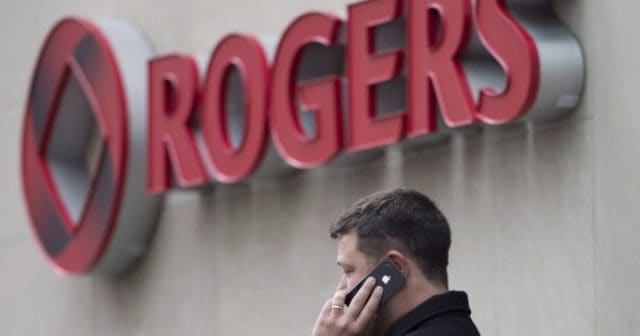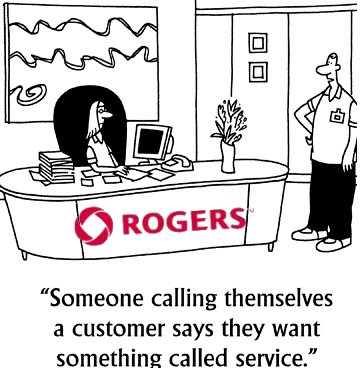 A special investigation by the Canadian Broadcasting Corporation found Rogers’ call center employees engaging in high pressure sales tactics, pushing customers to buy products and services they do not need.
A special investigation by the Canadian Broadcasting Corporation found Rogers’ call center employees engaging in high pressure sales tactics, pushing customers to buy products and services they do not need.
In emails and interviews with Go Public, a CBC consumer investigations unit that seeks to hold corporate and government powers accountable, more than a dozen Rogers workers report they’re under “extreme pressure” to hit sales targets or risk termination.
“You’re supposed to look at a customer’s account and sell them cable, home phone, home security, a credit card — whatever is missing,” says an employee who currently works at a large Rogers’ call center in Ottawa and has asked CBC to conceal his identity to avoid retribution in his workplace.
Employees report they are constantly under stress to meet sales quotas, which are not eased even an employee is out sick. Employees know Rogers will terminate call center workers that do not sell enough products to customers, which has created an atmosphere where some desperate workers sign up customers for services they do not understand or cannot use to keep their jobs.
One employee told the CBC he will sign up seniors for internet service, and inform them a technician will come to their home “to install a modem for their TV,” despite the fact modems are used with internet service, not cable television.
“We’re giving internet service to customers who actually do not have a computer,” he says.
The alleged corrupt business practices begin with the first job interview, where ex-employee Jessica Robinson was asked just how strongly committed she was to sell Rogers’ services.

CBC relied on several whistleblowers that are or were employees at Rogers Communications call centers. (Image courtesy of: Christian Patry/CBC)
“When I had my interview … they actually asked me ‘If an elderly lady calls in to cancel her sports package on her TV because her husband just died, are you going to convince her to keep it and add more?'” says Robinson.
Robinson echoed many other employees who told CBC they were expected to sell on every call, no matter the reason. If a customer calls to cancel service or report a service problem, before they get help, they will get a sales pitch.
To keep customers buying, representatives sometimes wrongly claim buying more products will result in a lower bill because of bundling discounts.
“Even customers who have home phone service, I say, ‘How about I add a second line for your home phone and I’ll give you a discount for your other product?’ Which makes no sense,” a representative said.
What the call center workers often don’t tell customers is they are also sneaking other items on to customer bills. The biggest are installation and activation fees for the services being pitched, which often run $25-50.
Customers are sure to call back 1-2 months later when a much higher-than-expected bill arrives, and those call center workers are trained to handle that as well.
That is what happened with Sheldon Nider in 2017 when the 72-year old resident of Richmond, B.C., called to upgrade his phone and inquire about adding a 25% corporate discount he was entitled to receive. After 90 minutes on the phone, a Rogers representative told him he did qualify and also sold him a phone for his granddaughter. The following month, a 17-page bill arrived in the mail. Nider’s bill unexpectedly jumped $135 a month and, just as bad, he did not get the corporate discount he originally called about.
“I think it’s a bait and switch because they bait you with a discount, then switch it and don’t give it to you. It’s as simple as that,” Nider told CBC.
Rogers later admitted in an email message to Nider the sales agent “misinformed” him, but that was all they were willing to do. When Go Public later contacted Rogers, the company grudgingly offered a $360 credit to address other issues, but still refuses to provide the corporate discount or end the expensive term contract he is now stuck with for the next few years. When Nider now calls for an explanation about other mysterious charges on his bill, the representatives seem empathetic, but don’t deliver customer satisfaction.
“They teach us how to be empathetic. To say things like ‘I understand how frustrating that must be,'” Robinson says about customers calling in to complain. “I’m like, why? We’re the ones screwing them over.”
Customers and workers are both left stressed about the insistent sales tactics. Customers don’t appreciate having to fight their way through a sales pitch to get their concerns addressed and employees are constantly worried they will be terminated because many customers either don’t want or cannot afford to add anything else to their bill.
Rogers employees claim their managers are well aware of these tactics and are also the source of much of the pressure. Despite a responsibility to monitor and manage ethical business practices on behalf of Rogers, managers are also rewarded for achieving sales quotas and bend over backwards to protect the most aggressive and unethical employees by avoiding monitoring their calls or questioning their sales.

Rogers sells cable TV, home phone, internet, cell phones, home security and other services. Its banking subsidiary even offers its own credit card.
“Managers know these reps are unethical,” says James Woodward, who worked in a Rogers call center two years ago. “So they try not to listen to those calls.”
Woodward told CBC managers don’t care what you sell as much as what you didn’t.
“I would get five cellphone activations in a day and sell a bunch of cable products, and then my manager would say, ‘No credit card?’ It was always what I didn’t do.”
When a customer calls to drop services or cancel altogether, there is a good chance that call will be dropped, because reducing your bill or closing your account will count against the employee’s sales targets.
“That’s why most customers have to call in three, four, five times to get a problem resolved,” says the employee working at Rogers’ Ottawa call center. “This is normal.”
At the end of each month, employees who fail to meet their targets can be forced to take “performance improvement” courses. If sales numbers still do not improve, they are likely to be terminated.
A Rogers spokesperson told the CBC the company’s sales targets are “achievable” and employees can be terminated for a number of reasons other than missing sales expectations. But Rogers’ Paula Lash added, “While we do not believe the concerns raised represent our values or sales practices, we take them very seriously and we will work with our team to respond to these concerns.”
An Ottawa-based public advocacy group, the Public Interest Advocacy Centre (PIAC) now wants the Canadian Radio-television and Telecommunications Commission (CRTC) to open a public inquiry on the matter. PIAC’s executive director John Lawford says the CBC report exposes a loophole in Canadian regulations, which do not currently cover industry sales practices.
Lawford says these sales tactics, and other similar incidents involving other large Canadian phone and cable companies, appear to directly target seniors, grieving spouses, and the visually impaired community.
“It’s completely appropriate for the CRTC to say, ‘We’re going to set out rules,'” adds Lawford. “I think it’d be quite eye-opening to have an open, public consultation at the CRTC about sales practices of big telecom companies.”
The former and current employees at Rogers who communicated with the CBC about the sales practices offered their own suggestion: “Stop increasing our targets. Stop pressuring us to try to make a sale on every call. And remove these [performance improvement] plans to get you fired.”
CBC-TV’s “The National” reports on Rogers Communications’ pushy sales tactics that sell customers services they don’t want or need. (4:09)
 Canadians, living under a regime of three national wireless carriers (Bell, Rogers, and Telus) pay some of the highest wireless prices in the world. A new plan announced today from Rogers Communications is unlikely to change that.
Canadians, living under a regime of three national wireless carriers (Bell, Rogers, and Telus) pay some of the highest wireless prices in the world. A new plan announced today from Rogers Communications is unlikely to change that.


 Subscribe
Subscribe Criminals are supposedly having a field day robbing cell phone stores in Canada after regulators ordered all cell phones to be sold unlocked, allowing customers to bring their devices to other carriers.
Criminals are supposedly having a field day robbing cell phone stores in Canada after regulators ordered all cell phones to be sold unlocked, allowing customers to bring their devices to other carriers. In 2016, Canadian telecom companies made $37.7 million from fees related to unlocking smartphones. That was a 75 percent increase in fee revenue since 2014.
In 2016, Canadian telecom companies made $37.7 million from fees related to unlocking smartphones. That was a 75 percent increase in fee revenue since 2014. “It appears that illegal activity may have shifted from the U.S. to Canada as some [American] carriers have begun to lock devices,” Bell officials told the CRTC.
“It appears that illegal activity may have shifted from the U.S. to Canada as some [American] carriers have begun to lock devices,” Bell officials told the CRTC. Fierce competition by eastern Canada’s largest internet service providers are driving down prices across the Greater Toronto Area by as much as 45%.
Fierce competition by eastern Canada’s largest internet service providers are driving down prices across the Greater Toronto Area by as much as 45%. Bell
Bell Rogers Communications’ call center workers treated customers as adversaries and allegedly placed unauthorized charges on customer bills, didn’t disclose service fees, and avoided downgrading or disconnecting service while managers encouraged these practices and lectured workers it was not their job to worry about what customers thought.
Rogers Communications’ call center workers treated customers as adversaries and allegedly placed unauthorized charges on customer bills, didn’t disclose service fees, and avoided downgrading or disconnecting service while managers encouraged these practices and lectured workers it was not their job to worry about what customers thought. In its original report, CBC News quoted a Rogers spokesperson who denied knowledge of these practices and declared there was no tolerance for employees who mistreated customers. But the latest group of employees to come forward consider the abuses systematic and occurred with the full knowledge of company managers and supervisors.
In its original report, CBC News quoted a Rogers spokesperson who denied knowledge of these practices and declared there was no tolerance for employees who mistreated customers. But the latest group of employees to come forward consider the abuses systematic and occurred with the full knowledge of company managers and supervisors.


